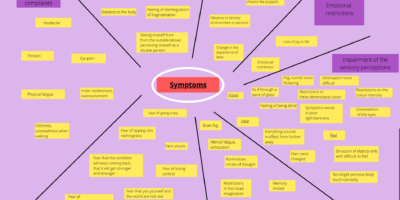Depersonalization and derealization: Misinformation and prejudice
1. Depersonalization and derealization only affect very few people!
False.
Most people repeatedly experience short phases of depersonalization or derealization (–>normality of DP/DR). For example, when they are very tired, taking drugs, being ill, mentally overwhelmed …
Recurrent and persistent feelings of unreality or alienation are also widespread. Around 2% of the total population are affected by this. This corresponds roughly to the percentage of people affected by anorexia.
Depersonalization and derealization are therefore not isolated phenomena, but are part of normal experience. Chronic feelings of unreality or alienation are also not rare, but affect many people.
However, these phenomena are still not talked about enough. As a result, many sufferers have the feeling that they are the only people far and wide who suffer from these symptoms.
2. If someone suffers from depersonalization or derealization, there is always severe traumatization behind it!
Wrong.
Only in a few cases of chronic depersonalization and derealization does this indicate severe traumatization in the biography or genesis of the symptoms. In these cases, depersonalization or derealization usually occur during the traumatic event itself or during unwanted recollections of it (as dissociative symptoms).
In most cases, no severe traumatization can be identified in those affected by feelings of unreality or alienation. The reasons for the occurrence of depersonalization and/or derealization lie in other areas.
3. If you have smoked pot, it is your own fault if you now suffer from depersonalization or derealization!
Wrong.
Many people who suffer from long-lasting depersonalization or derealization after taking drugs (often just once) blame themselves.
Even if chronic feelings of unreality or alienation were actually triggered by drug use in around 30% of those affected, these people are not to blame for what happened.
The reasons why depersonalization or derealization occur are usually much more complex and cannot be seen in a single drug intake (–>triggers of DP/DR).
4. Depersonalization and derealization never go away!
Wrong.
Even long-lasting depersonalization and derealization can go away. However, in most cases this does not “simply happen by itself”, but requires targeted work on the part of the person affected.
5. There is no medication for depersonalization and derealization!
Only partially true.
It is true that no medication is currently approved for the targeted treatment of depersonalization or derealization.
Nevertheless, many sufferers have good experiences with medication that is actually approved for other illnesses (so-called off-label use). In many cases, this can also have a positive effect on the course of chronic depersonalization or derealization.
6. Living with depersonalization or derealization makes no sense!
Wrong.
A person may be affected by depersonalization or derealization, but they still have the right to live their own and satisfying life.
Even with depersonalization or derealization, it is possible to find meaning in one’s life and achieve satisfaction.
Feelings of unreality or alienation should never be given so much power that they determine the entire life of the person affected.
7. Psychotherapy is ineffective against depersonalization or derealization!
Wrong.
Psychotherapies of various kinds are effective against chronic depersonalization and derealization.
The prerequisite for successful psychotherapy is that the person affected finds a person who is familiar with the symptoms and that the therapy is tailored to this. It is important for the person affected to take the therapy seriously and not to be too impatient. Changes will only occur over time.
In many cases, psychotherapy can lead to a significant reduction or even complete disappearance of the symptoms.
8. Apart from psychotherapy, there is nothing that can be done to combat depersonalization or derealization!
Wrong.
People who experience depersonalization or derealization are not helplessly at the mercy of the symptoms. There is a whole range of helpful strategies that they can use to combat the symptoms, even without psychotherapy (–>self-help for DP/DR).
Work on maintaining factors is also part of this, as is work on improving the quality of life.

Schreibe eine Antwort